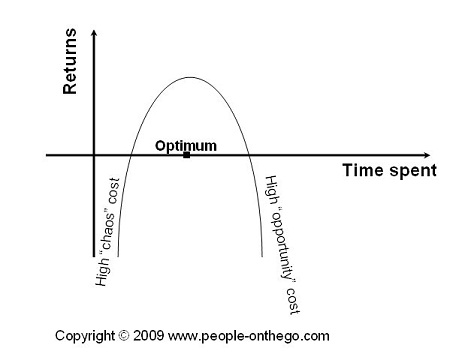 Our tasks can take much more time than necessary. This tends to happen more so when we are dreading the task for one reason or another, our motivation is low, and we would rather be doing something else or not doing anything at all. We try to keep at it, and hope that miraculously we will get it done, and it keeps expanding and spiraling into this never-ending thing as our resistance grows and grows.
Our tasks can take much more time than necessary. This tends to happen more so when we are dreading the task for one reason or another, our motivation is low, and we would rather be doing something else or not doing anything at all. We try to keep at it, and hope that miraculously we will get it done, and it keeps expanding and spiraling into this never-ending thing as our resistance grows and grows.
Now consider this. It is a similar task but on a different day or time. But this time, we happen to be in a good "mood". Life is good for whatever reason. We are motivated. We are moving faster (mentally and physically). We seem to stumble upon creative ways to address issues that once before were challenging or even overwhelming.
Wouldn't be nice to be able to somehow inject a doze of the latter "attitude" in the former situation and turn things around.
Here are some "attitude" changers to consider and act upon
1. Stop! There is no point in going when our wheels are spinning in place. We are not getting anywhere anyway. We are hitting the diminished return area on the Results CurveTM. Stopping may involve resetting expectations, but whatever it takes, we need to stop!
2. Play! Go as far away from the task as you can, mentally and physically. Whether a 5 minute meditational exercise, a 10 minute walk, or a dance class, or whatever it takes to dissolve whatever it is that is getting a hold of our motivation. The Now Habit goes as far as suggesting scheduling play time first before getting to the task time.
3. Better Manage Stress! It is possible that there are some underlying issues that are causing us more stress and worry than usual and that are confiscating our energy and our motivation. No matter how hard we try to solve the surface issues, if not addressed, these underlying issues will continue to slow us down. The thing to do is to address them one way or another. Refer to chapter 10 in The Accomplishing More With Less Workbook for some practical techniques.
4. Divide & Conquer! Divide the task into smaller components. Make each component no longer than 30 or even better 40 minutes worth of effort. Reset your own expectation about how long this task will take based on your new plan.
5. Acknowledge "effort"! Instead of being only end-results driven in this case, it would help us to shift our mind to "effort" instead of "results." Maybe counter-intuitive, but this may be exactly what we need to get over the hump and get to the end results. Don't forget to reward yourself along the way as you make progress.
6. Reach out! Reach out and get support in whatever way, form, or shape is applicable. Never Eat Alone emphasizes that more often than not, people are willing to help and we just need to ask, and we need to help them help us.
Happy new "attitude"!







 I needed to dive into this task that I reserved time for on my calendar which was to prepare for a Lotus Notes training session. I scheduled this on my calendar because it is important and I would like to get it done soon. To tell you the truth, lotus notes is not my favorite. I know my IBM friends may be a bit disappointed, but I think deep down, they know that too. So my mind came up with several interesting excuses, giving me great reasons and alibis for not doing what I know is the "right" thing for now.
I needed to dive into this task that I reserved time for on my calendar which was to prepare for a Lotus Notes training session. I scheduled this on my calendar because it is important and I would like to get it done soon. To tell you the truth, lotus notes is not my favorite. I know my IBM friends may be a bit disappointed, but I think deep down, they know that too. So my mind came up with several interesting excuses, giving me great reasons and alibis for not doing what I know is the "right" thing for now. Check-in with yourself right now, as you read this blog entry, what is it that you are avoiding or postponing? What is your "Lotus Notes". Finish what you're doing, and tackle this important task head it to head. Dedicate the next 40 minutes (not 30, but 40) to be fully focused on this task!
Check-in with yourself right now, as you read this blog entry, what is it that you are avoiding or postponing? What is your "Lotus Notes". Finish what you're doing, and tackle this important task head it to head. Dedicate the next 40 minutes (not 30, but 40) to be fully focused on this task! 
 Environmentally aware consumers are producing less waste by practicing the "3 Rs": Reduce. Reuse. Recycle. When it comes to productivity and accomplishments, we can use these same guidelines and reap some enormous benefits:
Environmentally aware consumers are producing less waste by practicing the "3 Rs": Reduce. Reuse. Recycle. When it comes to productivity and accomplishments, we can use these same guidelines and reap some enormous benefits: You have this long to-do list, and items keep getting added to it, and the list gets longer and longer. So what do you do? Here are three suggestions that can help.
You have this long to-do list, and items keep getting added to it, and the list gets longer and longer. So what do you do? Here are three suggestions that can help.
